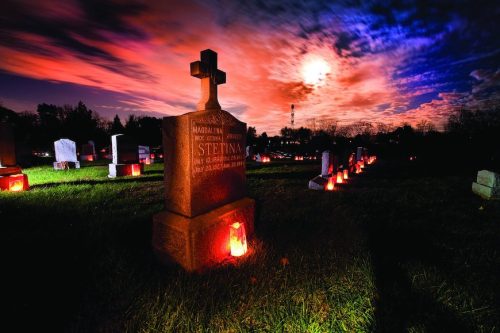
By Jenna Marie Cooper | OSV News
Q: Praying for the dead: where can this be found in the Bible? I don’t want any reference to the Catechism, thanks.
As you allude to in your question, many of the details regarding the church’s teaching on Purgatory (and the utility and appropriateness of praying for the dead) is part of our sacred tradition, much of which is summarized in works like the Catechism of the Catholic Church. I do feel compelled to point out that the truths of our faith being legitimately “handed down” via tradition is itself a scriptural concept. For example, in the New Testament St. Paul writes to the Thessalonians: “Therefore, brothers, stand firm and hold fast to the traditions that you were taught, either by an oral statement or by a letter of ours.” (2 Thessalonians 2:15).
We find a clear scriptural reference on the praiseworthyness of praying for the dead in the Old Testament’s second book of Maccabees. For context, the books of 1 and 2 Maccabees provide a historical narrative of the Jewish people’s fight to maintain their faith and culture in the face of Greek conquerors, and their eventual military liberation by the Maccabees and their leader, Judas. In chapter 12 of 2 Maccabees, we read that some of the Jewish warriors fell in battle, and it was subsequently discovered that they had been wearing pagan amulets in clear violation of the first commandment.
Upon learning this, Judas the Maccabee “then took up a collection among all his soldiers, amounting to two thousand silver drachmas, which he sent to Jerusalem to provide for an expiatory sacrifice. In doing this he acted in a very excellent and noble way, inasmuch as he had the resurrection in mind; for if he were not expecting the fallen to rise again, it would have been superfluous and foolish to pray for the dead. But if he did this with a view to the splendid reward that awaits those who had gone to rest in godliness, it was a holy and pious thought.” (2 Maccabees 12:43-45)
You might wonder why this passage isn’t better known, particularly in Protestant or Evangelical circles that highly value the role of sacred scripture. One reason for this is that the books of 1 and 2 Maccabees — along with other books such as Tobit, Sirach, and Wisdom — are part of what scholars call the “Deuterocanonical books,” sometimes also referred to as the “Septuagint.” While the early Fathers of the church discerned that these books should be included in the canon (i.e., the official “table of contents”) of scripture, in the 16th century Martin Luther disagreed that these works were the inspired word of God. Because of this, Protestant bibles omit the Deuterocanonical books.
Q: I was raised as a Roman Catholic and remember always seeing a number after the Pope’s name. I was taught the number indicated how many Popes had previously used the name. In reading the news stories about the recent synod, I notice that the Pope is simply referred to as Pope Francis. Is that a new change?
No, not at all. You are correct that many popes have numbers after their name to indicate how many of their predecessors have used that name before them. For example, Pope Benedict XVI was the sixteenth pope to use the name “Benedict.”
However, the custom is to start using numbers after the names of popes only when it is necessary in order to keep track and distinguish them from their same-named predecessors. Since Pope Francis is the first (and so far only) Pope to have taken the name “Francis,” there is no need for a numeral after his name. But if we were to ever have a “Pope Francis II” in the future, then we would retroactively refer to our current Pope Francis as “Francis I.”
– – –
Jenna Marie Cooper, who holds a licentiate in canon law, is a consecrated virgin and a canonist whose column appears weekly at OSV News. Send your questions to CatholicQA@osv.com.






















